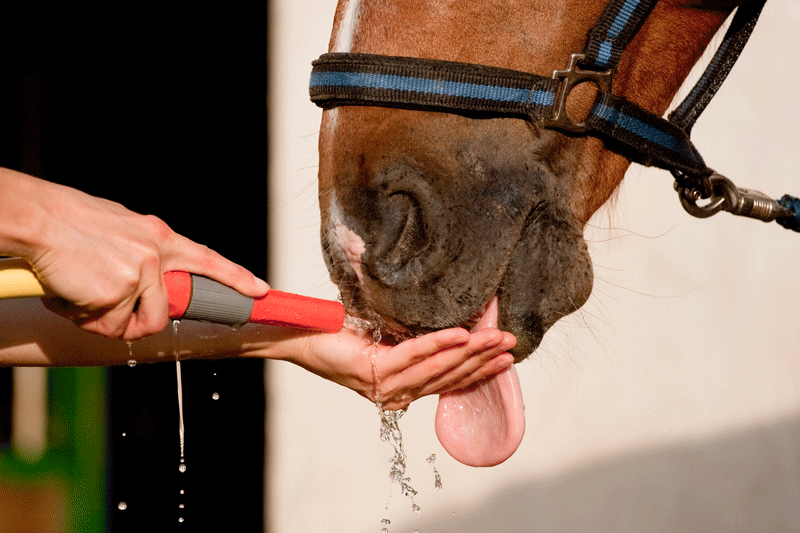By understanding some key points about water and hydration, horse guardians can ensure their equine partners stay hydrated and healthy throughout the year.
How much water?
Although the average water intake for a mature horse is 10 to 12 gallons per day, in reality there are many factors which dictate how much a horse really needs. A horse’s size, environmental temperature and humidity, body temperature, activity level, and salt intake all play a role. Hard-working horses and lactating mares may require twice the normal amount. Whatever your horse’s specific needs, it’s extremely important to provide full access to fresh healthy water in a clean tank at all times.
Dehydration
Dehydration is the loss of body fluids and can range from mild to serious. A loss of 12 to 15% of body water can be life-threatening and requires immediate veterinary intervention. Inadequate water consumption, fever, choke, long trailering trips, diarrhea, and over-exercise in hot weather can all contribute to dehydration.
Signs of this condition include heart rate over 60 bpm, depression, weakness, capillary refill time over three seconds, dark urine, dry manure and sunken eyeballs. Pinch the skin on the lower chest; if it stays tented or is slow to spring back, this is a sign of moderate to severe dehydration.
How to prevent dehydration
Keep your water tanks clean. Heat, sunlight and organic material quickly contribute to algae and fungi in tanks. Loose white salt is great for cleaning and leaves no harmful residue behind. For tougher cases, lemon essential oil can be added to the salt. For large tanks, some people use goldfish to eat the algae but this may not work if you have mischievous horses.
Make sure it’s safe. Although most drinking water sources are safe, some well water may contain high levels of selenium, arsenic, lead, iron or bacteria. If in doubt, have it tested. Never connect copper tubing to galvanized pipes as it could result in toxic levels of zinc.
Don’t forget the salt. Sodium is critical in sustaining normal hydration. Offer free-choice loose white salt (sea salt is preferable) 24/7 and add a minimum of two tbsp per day in feed. In very hot and/or humid weather or with strenuous exercise, you can double this amount. Horses are NOT able to get their daily salt requirement from a salt block.
Consider electrolytes. An electrolyte mix is not normally required for most idle horses but may be necessary for those who sweat in their daily activities. Use caution here since over-supplementing or dosing a dehydrated horse can overload the urinary system and kidneys.
Support for dehydration
Dehydration can be a serious and possibly life-threatening condition. A veterinarian’s intervention is needed for moderate to severe cases. For mild cases, you can consider these natural options for support.
Homeopathic China officinalis can help restore proper fluid balance. 30c potency three times a day for three days.
Herbal dandelion extract is a natural electrolyte source. 5 ml of extract in equal amounts of water. Syringe into mouth.
Molasses water (not recommended for IR horses) is high in calcium, magnesium and B vitamins. Use 1 tbsp molasses and 1 tbsp sea salt in 22 pints of water in a bucket.
The take-home message is that many dehydration cases can be prevented by sound water management. Water is life, so be pro-active in ensuring your equine partner stays hydrated at all times of the year.








